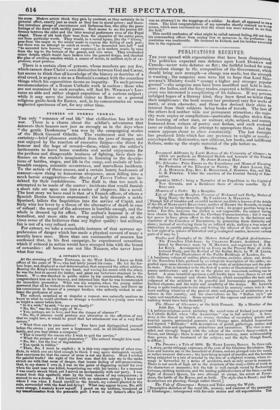STORIES OF TORRES VEDRAS.
THE only "romance of real life" that civilization has left us is war. There is a charm about the soldier's adventures that interests their hearers now just as strongly as in the days when "the gentle Desdemona" was won by the campaigning stories of the Black General Othello. The excitement and the un- certainty—brief pleasures snatched from the jaws of danger, and rest enjoyed by the reaction of excessive fatigue—the thirst for honour and the hope of reward—these, which are the soldier's incitements to leave home comforts and social enjoyments for the perilous and disagreeable business of fighting, have their in- fluence on the reader's imagination in listening to the descrip- tions of battles, sieges, and life in the camp, and recitals of hair- breadth escapes, romantic occurrences, and marvellous incidents. To the action of these causes, and a certain hearty bonhommic of manner—now rising to humorous eloquence, anon falling into a mock heroic exaggeration—the Stories of Torres Vedras arc in- debted for their readableness. The fault is, that too much is attempted to be made of the matter : incidents that would furnish a short tale are spun out into a series of chapters, like a novel. The best story we have read is that of a French officer, of whom a Spanish Donna becomes enamoured : the lady discards a noble Spaniard, masts the Inquisition into the service of Cupid, and fairly wins her lover by a threat of the alternative of death in case of refusal : the sequel of the. adventure is horrible enough, and the whole is dressed up for effect. The author's humour is of' the homeliest, and more akin to strong animal spirits and an ob- vious sense of' the ludicrous than any higher quality : but military fun is not of a very refined sort. For extract, we take a remarkable instance of that nervous ap- prehension of danger which has made a physical coward of many a morally brave man. More than one commander of renown has confessed that, in his first campaign, he experienced sensations which if evinced in action would have stamped him with the brand of cowardice : all heroes are not like NELSON, who never knew what fear was.
A COWARD'S BRAVERY.
At the storming of 3Iorne Fortunee, in the West Indies, I knew an Irish officer of the name of W—, who had lately joined his corps. He led the for- lorn hope, and displayed a cool determination that surprised the oldest soldiers. Bearing the King's colours in one hand, and waving his sword with the other, he was the first to ascend the ladder, and plant our victorious standard in the breach. W— was thanked in public orders by his commanding officer, who congratulated him on his bravery, and informed him that he was recommended for immediate promotion. What was his surprise, when the young soldier answered that all he wished to obtain was leave to return home, and throw up his commission in favour of a younger brother, who ardently wished to em- brace the profession of arms.
The colonel, surprised at so singular a request, was naturally anxious to know to what he could attribute so strange a resolution in a young mail with so bright a career before him. "Is it a wish," he said, "to see your family?" "No, Sir," was the cold reply of W—. "You, perhaps, are in love, and fear the danger of absence ?" "No, Sir, if absence could produce any alteration in the affection of one that we might love, it would be proof that her attachment was of a very frail nature."
"What then can be your motives ? You have just distinguished yourself before the enemy : you are now a lieutenant, and, in all likelihood, another battle, and you may obtain a company." "This is exactly the reason why I wish to quit the service." "What the prospect of rapid promotion :" The colonel thought him mad. "No, Sir ; but the fear of degradation." "You speak in riddles."
"Then, Sir, I must be explicit ; it is this very expectation of other con-
flicts, in which you are kind enough to think I may again distinguish myself, that convinces me that the career of arms is not my destiny. Must I confess the painful truth? the sight of the first man that fell near me in the ranks struck me with that sense of danger, that innate feeling of self-preservation, that, to my shame I own it, I was on the point of disgracing myself for ever when the next man was killed, bespattering me with his brains ; tor a moment I was nearly struck blind, yet I moved on mechanically with our party. I was roused from this apathetic state by the loud cheers of my companions ; it seemed to Inc &dream. I felt inspired with an unknown energy ; I knew not where I was when I found myself on the breach, my colours planted in the ruin, surrounded with the dead and dying! What may appear to you, Sir, still more strange, I scarcely knew myself. I gazed on my uniform, wondered at my tsansformation from the peaceable garb I wore in my father's office (he was an attorney) to the trappings of a soldier. In short, all appeared to me a vision. The kind congratulations of my comrades shortly restored me to my senses, which soon convinced me that the closet was more natural to me than the field."
This candid confession of what might be called natural feeling, did not deter his commanding officer from urging him to persevere in the profession : his resolution was unalterable. He returned to Ireland, and his brother succeeded him in the regiment.


























 Previous page
Previous page